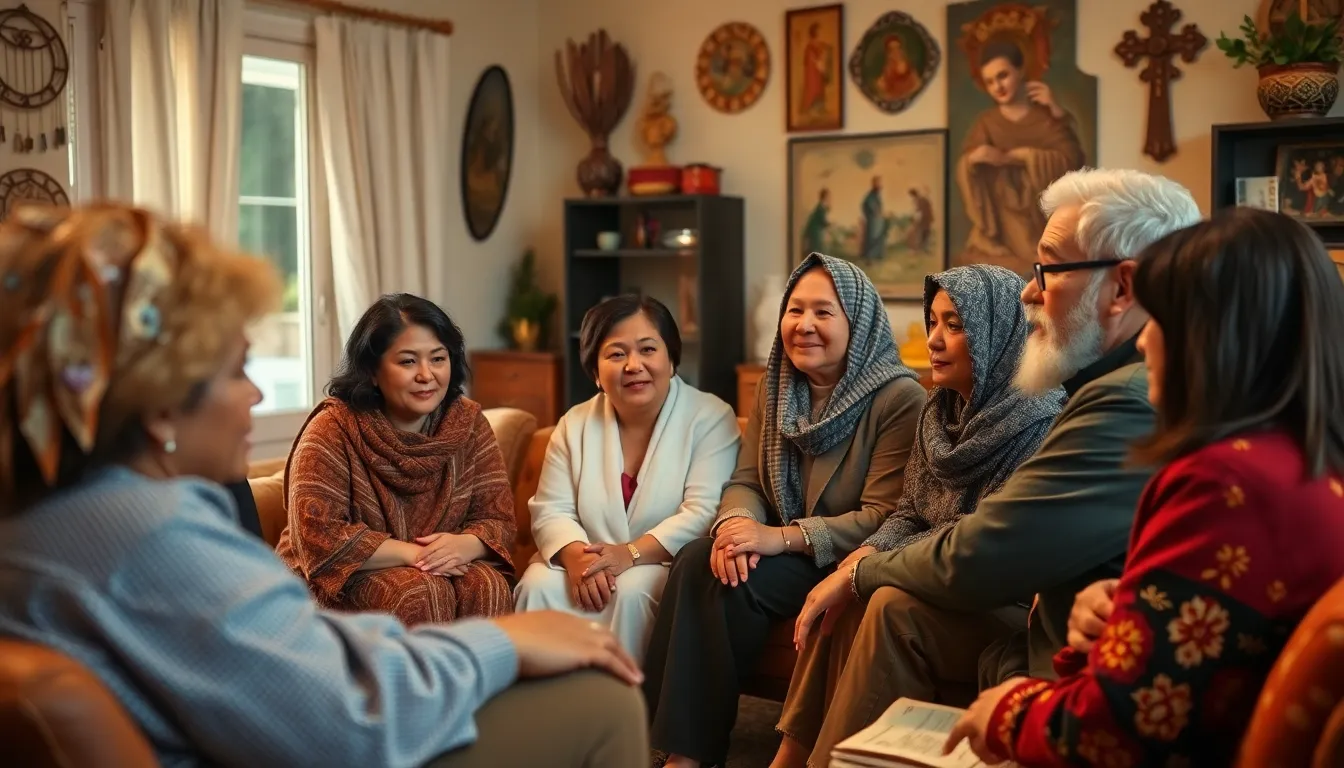Table of Contents
ToggleBelief is a powerful force that shapes lives, influences decisions, and even determines what’s for dinner. Whether it’s the unwavering faith in a favorite sports team or the conviction that pineapple belongs on pizza, beliefs color our world in more ways than we realize. They can lift us to great heights or keep us stuck in a rut, and understanding this duality is key to unlocking personal growth.
In a world filled with opinions and information overload, distinguishing between what’s fact and what’s fiction can feel like trying to find a needle in a haystack. Yet, belief isn’t just about holding onto ideas; it’s about the impact those ideas have on our daily lives. So, let’s dive into the fascinating realm of belief and explore how it can empower or hinder us, all while keeping a smile on our faces.
Understanding Belief
Belief plays a crucial role in personal and societal contexts. This section delves deeper into its definition and significance.
Definition of Belief
Belief refers to a mental acceptance of something as true or real. It encompasses a range of convictions, from factual to personal opinions. A belief can stem from experiences, teachings, or societal influences. Individuals often adopt beliefs to navigate their environments. The typology includes strong convictions, such as faith in ideologies, and more flexible ideas, like preferences. Understanding the nuances of belief aids in comprehending its impact on behavior and decision-making.
Importance of Belief in Human Experience
Belief significantly shapes human experiences, guiding choices and actions. It influences attitudes toward relationships, work, and self-perception. People tend to rely on their beliefs to derive meaning from events. Strong beliefs can inspire motivation and resilience during challenges. Conversely, limiting beliefs restrict potential growth and promote stagnation. Individuals confront a complex world filled with conflicting information, making the exploration of personal belief essential. Examining beliefs fosters deeper self-awareness and promotes positive change.
Types of Beliefs

Beliefs manifest in various forms and influence individuals differently. Understanding these types provides insight into personal and societal dynamics.
Personal Beliefs
Personal beliefs develop from individual experiences, reflections, and learning. These concepts shape opinions about oneself and the world. For example, someone may hold a belief in their ability to succeed, influencing career choices. Trust in personal convictions drives motivation and decision-making. Reflection encourages individuals to examine these beliefs regularly, fostering growth and self-awareness.
Cultural Beliefs
Cultural beliefs derive from shared values and norms within a community. They guide behaviors and shape identity. For instance, traditions passed down through generations can influence dietary choices, social practices, and celebrations. These beliefs often dictate what individuals find significant or acceptable in their lives. Exposure to diverse cultures expands understanding and can challenge personal beliefs, prompting deeper reflection and reevaluation of values.
Religious Beliefs
Religious beliefs encompass faith in spiritual doctrines and practices. These convictions often provide individuals with a sense of purpose and community. Many adhere to teachings that influence morals and behaviors. For example, an adherence to religious principles can guide decisions on ethical dilemmas. Religious beliefs also foster a sense of connection among followers, reinforcing shared faith and support within a community.
The Psychology of Belief
Beliefs deeply influence individual behavior and thought processes. They stem from various experiences and can either empower or constrain a person.
The Formation of Beliefs
Beliefs form through interactions with the environment, including family, culture, and personal experiences. Childhood experiences significantly shape initial beliefs. Exposure to information and education plays a crucial role in either reinforcing or challenging these beliefs. Peer influence often reinforces societal norms, leading to adherence to cultural values. Additionally, significant life events can reshape existing beliefs, driving a reevaluation of perspectives. Beliefs also undergo transformation as individuals gain new insights, reflecting the dynamic nature of human understanding.
The Role of Cognitive Dissonance
Cognitive dissonance arises when individuals encounter conflicting beliefs or information. This psychological conflict often generates discomfort, prompting a desire for resolution. Strategies such as altering a belief, justifying choices, or changing behaviors frequently emerge. Individuals may choose to disregard opposing information, prioritizing consistency over accuracy. Resolutions often lead to stronger adherence to existing beliefs, solidifying personal viewpoints. In some instances, this process fosters growth, encouraging reassessment of one’s beliefs. Understanding cognitive dissonance provides valuable insights into how beliefs can align with personal identity and decision-making.
Belief Systems and Their Impact
Belief systems profoundly shape individuals and societies, influencing behaviors and interactions in various contexts.
Social Implications
Social dynamics often reflect deeply rooted beliefs. Shared beliefs create communal bonds, uniting individuals around common values and goals. Cultural rituals, social norms, and behavioral expectations emerge from these collective ideas. Conflicting beliefs can lead to division, causing tensions within societies. Individuals may experience social pressure to conform to predominant beliefs, which can limit personal expression. Notably, understanding these dynamics aids in fostering dialogue and empathy. It encourages individuals to consider alternative perspectives, leading to richer community interactions.
Beliefs and Decision Making
Decision-making processes hinge on individual beliefs. Personal convictions act as filters through which options are evaluated. Cognitive biases often arise from deeply held beliefs, affecting risk assessments and outcome expectations. Strong beliefs can drive individuals to pursue specific goals, enhancing motivation and clarity in choices. Conversely, limiting beliefs can paralyze decision-making, causing procrastination or avoidance. Awareness of these influences allows for more thoughtful and deliberate choices. Evaluating beliefs fosters a more objective approach, enabling individuals to align decisions with their values and desired outcomes.
Belief is a powerful force that shapes individual experiences and societal dynamics. It influences decisions and interactions while guiding personal growth and self-awareness. By examining their beliefs, individuals can unlock potential and foster positive change in their lives.
Understanding the dual nature of beliefs allows for a more nuanced perspective on how they can either empower or limit. As people navigate a world filled with diverse opinions and conflicting information, embracing open dialogue and empathy becomes essential.
Ultimately, the journey of belief is one of exploration and reflection, offering opportunities for deeper connections and meaningful choices. With a thoughtful approach to beliefs, individuals can create a life aligned with their values and aspirations.








